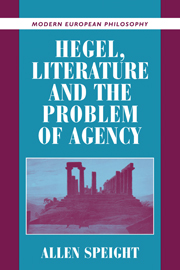Book contents
- Frontmatter
- Contents
- Acknowledgments
- Introduction
- 1 “Hegel's Novel”: The Phenomenology of Spirit and the Problem of Philosophical Narrative
- 2 Tragedy and Retrospectivity: Hegel's Antigone
- 3 Comedy and Theatricality: Desire, Bildung, and the Sociality of Agents' Self-Knowledge
- 4 Forgiveness and the Romantic Novel: Contesting the Beautiful Soul
- 5 From the Phenomenology to the Philosophy of Right: Hegel's Concept of the Will and the Possibility of Modern Ethical Life
- Selected Bibliography
- Index
3 - Comedy and Theatricality: Desire, Bildung, and the Sociality of Agents' Self-Knowledge
Published online by Cambridge University Press: 18 November 2009
- Frontmatter
- Contents
- Acknowledgments
- Introduction
- 1 “Hegel's Novel”: The Phenomenology of Spirit and the Problem of Philosophical Narrative
- 2 Tragedy and Retrospectivity: Hegel's Antigone
- 3 Comedy and Theatricality: Desire, Bildung, and the Sociality of Agents' Self-Knowledge
- 4 Forgiveness and the Romantic Novel: Contesting the Beautiful Soul
- 5 From the Phenomenology to the Philosophy of Right: Hegel's Concept of the Will and the Possibility of Modern Ethical Life
- Selected Bibliography
- Index
Summary
Hegel remarks somewhere that all the great events and characters of world history occur, so to speak, twice. He forgot to add: the first time as tragedy, the second as farce.
Marx, The Eighteenth Brumaire of Louis Bonaparte[H]is talent depends not, as you think, upon feeling, but upon rendering so exactly the outward signs of feeling, that you fall into the trap. He has rehearsed to himself every note of his passion. He has learnt before a mirror every particle of his despair.
Diderot, Paradoxe sur le comédienBoth in the Phenomenology of Spirit and in his later official theory of dramatic genres, Hegel sees comedy as a sort of end or completion of tragedy. In the Aesthetics, Hegel speaks of tragedy and comedy as “opposed ways of looking at human action”: “comedy has for its basis and starting-point what tragedy may end with, namely an absolutely reconciled and cheerful heart.”
Many of Hegel's readers have discerned what they take to be a similar move within the larger narrative framework of his view of human action – a move that is not infrequently attributed to the perceived Hegelian tendency toward reconciliation. As Judith Butler puts it, for example:
[F]or Hegel, tragic events are never decisive. There is little time for grief in the Phenomenology because renewal is always so close at hand. What seems like tragic blindness turns out to be more like the comic myopia of Mr. Magoo whose automobile careening through the neighbor's chicken coop always seems to land on all four wheels.
- Type
- Chapter
- Information
- Hegel, Literature, and the Problem of Agency , pp. 68 - 93Publisher: Cambridge University PressPrint publication year: 2001



